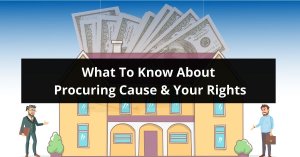As a real estate agent, you‘ll put in many hours working with your clients before receiving payment. This includes finding and showing the property, marketing it, and all of the negotiations, phone calls and travel time.
After you’ve done all of this work and your client buys or sells the property, you rightfully feel entitled to a commission of the sale. That is where Procuring Cause comes in. But what is procuring clause?
Procuring cause is simply your right to collect a commission on the sale of a property. It refers to the interaction between a real estate agent and a buyer or seller that directly results in the sale.
But what if the buyer uses more than one agent? What if both agents happened to show the same piece of property that was purchased? Who is entitled to commission?
After signing the contract in the MLS, other agents may file a complaint leading to a commission dispute if they, too, had shown the buyer the property which was purchased. This is where the issue lies as both of you likely did the work but only one of you will get paid.
If you are facing a commission dispute, there are some things you should know.
There is no predetermined rule of entitlement.
Who showed the property, represented the buyer and who made the successful offer will not solely determine who is entitled to the commission from the sale. Each claim needs to be reviewed individually to determine who is the procuring cause.
“Every arbitration hearing is considered in light of all of the relevant facts and circumstances as presented by the parties and their witnesses. “Rules of thumb,” prior decisions by other panels in other matters, and other predeterminants are to be disregarded.
Procuring cause shall be the primary determining factor in entitlement to compensation. Agency relationships, in and of themselves, do not determine entitlement to compensation. The agency relationship with the client and entitlement to compensation are separate issues. A relationship with the client, or lack of one, should only be considered in accordance with the guidelines established to assist panel members in determining procuring cause. (Adopted 4/95)”
The best way to protect yourself is by getting all the information about the buyer upfront. Make sure they are not working with any other real estate agent and explain to them the importance of using only one agent.
From there it is wise to enter into a buyer’s agent agreement. If you and the buyer hold up to your ends of the agreement there should be no disputes regarding procuring cause.
If your buyer has entered into a buyer’s agent agreement with you, and your buyer ends up breaching the contract by using another agent before canceling their agreement with you, you may be able to take legal action against the buyer.
Once the buyer is committed to you, it is essential to remain actively involved with the agent in a professional manner. Even with an active Buyer’s Agent Agreement, the buyer may be justified in using another agent of account of the first agent’s lack of activity, professional conduct, and/or efforts to work with them.
Procuring Cause in Real Estate FAQ
Now that you know the ground work and basics of Procuring Cause, here are some commonly asked questions and answers for both real estate agents and home buyers.
What does procuring cause of the sale mean?
In real estate, procuring cause is when an agent or broker’s efforts directly produces a buyer or seller.
Do you have to use the realtor that showed you the house?
You have to use the realtor that showed you a home only if you signed a buyer’s agent agreement. Once you sign a buyer’s agent agreement, you must use that agent if you opt to use another agent without canceling the contract, it may result in a legal suit.
What is an exclusive right to sell in real estate?
Exclusive right to sell is the contractual agreement in which the listing broker acts as the seller or legally recognized non-agency representative of the seller. The seller agrees to pay the listing broker regardless of whether the efforts of the listing broker directly sold the home. They must pay the listing broker unless the property is sold to one or more individuals or entities that the seller has established as exemptions in the listing agreement.
When a transaction fails to close is the brokerage entitled to the commission?
The brokerage is only entitled to a commission if the failure to close is the seller’s fault.
Can a realtor sue a buyer?
A realtor can sue buyers and sellers. This is typically on account of a breach of contract. It may also occur if they feel that a commission has been withheld.
How can a seller back out of a real estate contract?
A seller can back out of a real estate contract by adding contingencies to the sales contract. To make a sale contingent, the seller will have to add terms such as having an agreement to buy another house. Contingencies must be built into a contract before it is signed for a seller to have the right to back out of a sale. Additionally, a seller may back out on account of the buyer’s failure to perform. Otherwise, a seller who backs out of the transaction can be sued for a Breach of Contract.

